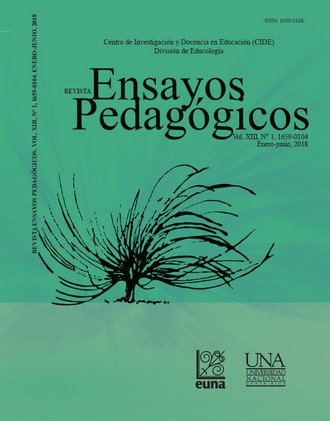On the Need to Include Critical Pedagogy of the Latin American Kind in the Public Education System of Costa Rica
DOI:
https://doi.org/10.15359/rep.13-1.2Keywords:
pedagogy, education, cognition, ethics, Costa Rica, Latin AmericaAbstract
The following essay is about the need for including critical pedagogy of Latin American origin as one of the main principles in the public educational system of Costa Rica. Hence, from the author´s perspective, teaching in this country has been dominated by European models, which however correct at the time of being implemented in this context, they lack the critical, ethical, aesthetic and political approach that can be strictly provided by a Latin American critical pedagogy standpoint.
References
Amiguet, L. (2016, abril 11). Una mala persona no llega nunca a ser buen profesional. Periódico La Vanguardia. Recuperado de http://www.lavanguardia.com/lacontra/20160411/401021583313/unamala-persona-no-llega-nunca-a-ser-buen-profesional.html
Cabaluz F. (2015). Entramando pedagogías críticas latinoamericanas. Santiago: Quimantú.
Freire, P. (1978). La educación como práctica de la libertad. Madrid: Editorial Siglo XXI. Freire, P. (1993). Pedagogía del oprimido. Madrid: Siglo XXI.
Giroux, H. (1990). Los profesores como intelectuales: Hacia una pedagogía crítica del aprendizaje. Barcelona: Editorial Paidós.
McLaren, P. (1997). Pedagogía crítica y cultura depredadora. Barcelona: Paidós.
Ministerio de Educación Pública de Costa Rica (1994). Política Educativa hacia el Siglo XXI. Despacho del Ministro. San José, Costa Rica. Recuperado de http://www.mep.go.cr/politica-educativa
OECD. (2015). Informe PISA 2015. Recuperado de https://www.oecd. org/pisa/publications/
Downloads
Published
How to Cite
Issue
Section
License
Ensayos Pedagógicos is subscribed to the Attribution-NonCommertial-NoDerivatives 4.0 International Creative Commons Licence, which allows both authors and readers to freely download, store, copy, and distribute the final approved publisehd version of the manuscript (post-print) as long as this is done without commercial purposes, no derivative works are generated, and the source and author are mentioned. As well, Ensayos Pedagógicos declares that authors will remain the rightful owners of the copyrights of their work in perpetuity.







